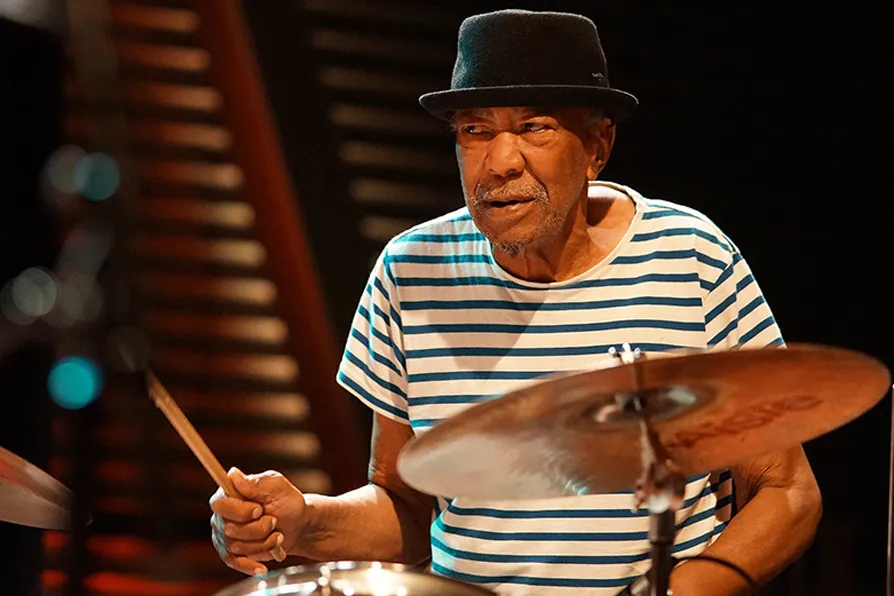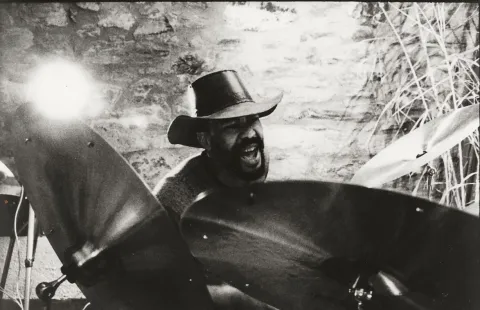DENNIS BROE searches the literary canon to explore why a duplicitous, lying, cheating, conning US businessman is accepted as Scammer-in-Chief
CHRIS SEARLE pays tribute to the late South African percussionist, Louis Moholo-Moholo

 Louis Moholo (pictured 2019) moved to London with the legendary Blue Notes in 1964. This band revitalised jazz and improvised music through the influence of songs from the South African townships [Pic: Dirk Neven/CC]
Louis Moholo (pictured 2019) moved to London with the legendary Blue Notes in 1964. This band revitalised jazz and improvised music through the influence of songs from the South African townships [Pic: Dirk Neven/CC]
IT WAS June 1976, a week after the massacre of schoolchildren in Soweto, South Africa, murdered by the apartheid police as they were demonstrating for their language rights, to learn the internationalism of English rather than the compulsory word-fetters of Afrikaans.
At our school in Poplar, east London, the Bishop of Stepney and founding father of the Anti-Apartheid Movement, Trevor Huddleston, had just given a moving assembly, lamenting the deaths and praising the resistance of so many children, some of whom had been the daughters and sons of his ex-parishioners. Immediately after this, our 14-year-old students sat at their desks and wrote poems and stories extending themselves to the young protesters, words of empathy and solidarity across thousands of miles.
To accompany their writing, I played on our classroom stereo the Dudu Pukwana album In The Townships, a rampaging session of township jazz featuring Pukwana’s alto saxophone, Mongezi Feza’s trumpet and Louis Moholo-Moholo’s drums — all three musicians ex-members of The Blue Notes plus bassist Harry Miller, rebels and refugees from apartheid who had arrived in London in 1964 and turned British jazz inside out with their insurgent artistry.

The students grooved to their sounds and their words gave witness. I remember Ghana-born Andrew’s verse: “Children fell to the ground/ Like leaves from a tree,/ The sight was unbelievable,/ You should have been there to see…”.
And his white friend Philip wrote: “The Afrikaans language we’ll not stand,/ They call us slaves, they work us to the ground./ We’ll go on that march and tell the whites,/ ‘No Afrikaans! We have our rights!’”, and later in his poem, as the protesters marched: “One’s been shot, he’s dead, he’s dead!/ There’s something coming out of him/ its colour is red…”.
These lines came cascading back to me after half a century when I learned last week of the passing in his home city of Cape Town, of the great drummer Moholo-Moholo, called by his last powerful bassist, Londoner John Edwards, “our beautiful Louis.”
I’ll leave it to the musicians who loved him to describe his incomparable influence. Fellow drummer Mark Sanders, his roots in Belize and London, told me: “Louis’s tremendous skills as a musician with power, subtlety, nuance, groove and freedom were a mind-blowing joy to behold for me as a young drummer starting out in London, and a gift for all his fellow musicians and audiences alike.”
His final pianist-compadre in his last band, (they also made a riveting duo Ogun album together, Keep Your Heart Straight in 2011), Alexander Hawkins, said this of Louis’s compelling brilliance and humour:
“If I had never met him, Louis would have had a profound influence on me from his recorded legacy and for what he represented, but the truth is I had the privilege of hearing him from one of the best seats in the house for well over a decade (and even then was the baby of the band). That was an education and joy which it’s hard to describe. He was at the same time among the most supportive drummers as well as constantly stoking the fires, driving everyone on the bandstand to levels which they didn’t know were there.
“Freedom was everything to him, but it was a celebratory ‘freedom to’ rather than a ‘freedom from’ as defined by someone else’s rules. Where the music was really happening, he’d often come off stage after the gig exhausted, and with a grin turn to us and break out his best Oliver Hardy: ‘Another fine mess’!”
So much of Africa’s genius is born in the drum. Louis embodied that and lives on in the many recordings he made for Hazel Miller’s Ogun label. His throbbing pulse will live forever, just like it did on In The Townships 50 years ago, as our London children, now in their 60s, wrote their poems of love and solidarity to the children of South Africa.
Long live his drumsong and message of freedom!

WILL STONE is impressed by a tour de force rendition of three decades’ worth of orchestral chamber pop

WILL STONE relishes the chance to hear the Isle of Wight indie sensation in an intimate setting

Re-releases from Bobby Wellins/Kenny Wheeler Quintet, Larry Stabbins/Keith Tippet/Louis Moholo-Moholo, and Charles Mingus Quintet

CHRIS SEARLE speaks to saxophonist and retired NHS orthopaedic surgeon ART THEMEN









